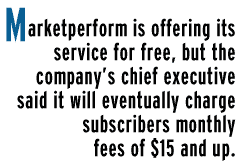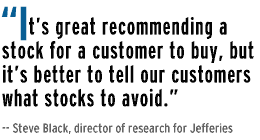| |||||||||

Was that "buy" rating worth it?
 A new Web service allows you to see which brokerages will make you richer and which ones will just make you broke. A new Web service allows you to see which brokerages will make you richer and which ones will just make you broke. And best of all, you can use this service absolutely free. The site has not yet developed a credit card processing system, so it is letting anyone subscribe at no cost. Marketperform.com tracked the stock recommendations made by the top 48 brokerages back to February 1999. This period includes a boom year, during which the Nasdaq doubled, and a bear market when it collapsed, losing more than 60 percent of its value. Each time a brokerage issues a stock recommendation, Marketperform records the price of the stock on that date. The service then reports how much money you would have made after buying each stock. Marketperform computes the average profit if you would have sold each stock one month, three months, or six months later--or whenever the broker lowered the stock's recommendation. At my request, Marketperform performed an analysis of technology stocks only. This analysis rated 33 brokerages that make a substantial number of "buy" recommendations in the tech sector. The biggest loser during the past two years, according to Marketperform's statistics, was Jefferies & Co.. The tech stocks that Jefferies put in its "buy" category, its highest recommendation, had lost an average of 41 percent six months later--or by the time the rating was downgraded, whichever came first.
Almost as bad were the tech stocks recommended by CE Unterberg Towbin. Its list
declined an average of 31 percent. And the top choices of H.C. Wainwright & Co. were down 25
percent. Steve Black, director of research for Jefferies, said his company's clients are typically large financial institutions that do not simply follow a brokerage's "buy" recommendations. "It's great recommending a stock for a customer to buy," Black said, "but it's better to tell our customers what stocks to avoid." Herb Maher, managing director of equity research for H.C. Wainwright, cited different figures than Marketperform's analysis. He said an investor who followed Wainwright's recommendations in all sectors--not just technology--would have gained 40.9 percent in 1999 while the Nasdaq rose 85 percent. In 2000, Wainwright's recommended stocks declined 10.9 percent, compared with a Nasdaq drop of 39 percent, Maher said. CE Unterberg Towbin did not respond to calls seeking comment. Meanwhile, the highest-rated brokers had nothing to complain about. The portfolio of tech stocks recommended by Gerard Klauer Mattison rose an average of 51 percent during the study. Also successful was Needham & Co., with a gain of 48 percent in the tech stocks it rated "strong buy." Ironically, stocks that Needham ranked a mere "buy" did even better, advancing 64 percent. Banc of America Securities was another winner, up 43 percent. Remarkably, no service other than Marketperform seems to reveal this kind of performance data to the public. Wall Street's mountain of statistics, which took the company's programmers more than a year to massage into a usable form, may have been too daunting. Eric Shkolnic, the company's chief executive, says Marketperform subscribers will eventually be charged $15 per month and up. In return, they will receive notices by e-mail when brokers issue stock recommendations. For the next month or two, though, anyone can create up to 10 different "alert rules" at Marketperform and receive the notices free. Marketperform's vast database can be hard to understand at first. But I think you'll find that time spent here is a good investment. Brian Livingston's Wired Watchdog column appears at CNET News.com every Friday. Do you know of a problem affecting consumers? Send info to tips@BrianLivingston.com. He'll send you a book of high-tech secrets free if you're the first to submit a tip he prints. on the soapbox |
|
|||||||||||||||||||||||
|
Send us news tips | Contact Us | Corrections | Privacy Policy |
|

